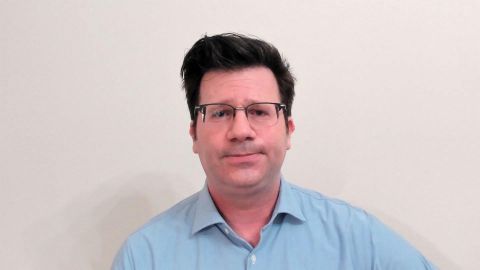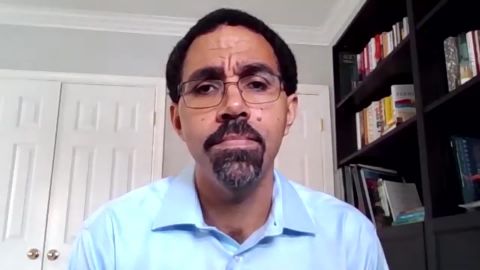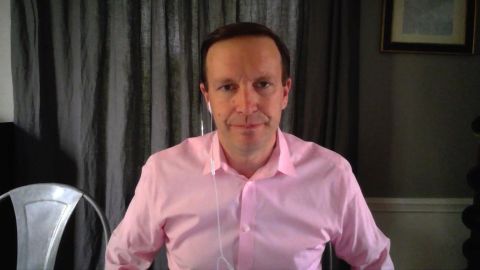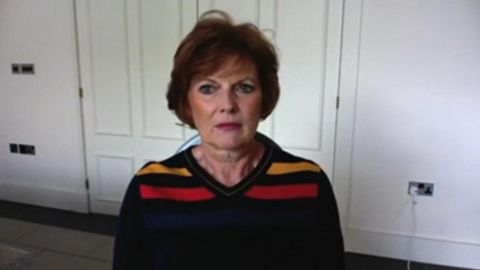Read Transcript EXPAND
CHRISTIANE AMANPOUR: And now, another casualty of COVID-19 is education. In the U.K., and the United States, and all over the world, over a billion-and-a-half children and youth remain out of school. Former U.S. secretary of education, John King Jr. says the pandemic will have a lasting impact. He joined our Hari Sreenivasan to talk about the challenges some 50 million American students are facing right now and how a place of learning became a shelter when tragedy hit his own home.
(BEGIN VIDEOTAPE)
HARI SREENIVASAN: Right now, we have 50 million kids out of school; 29 states are not going to come back this school year. And most of the research says that, to do distance learning well, you needed to prepare. And, right now, most of these school districts just went into this overnight.
JOHN B. KING, PRESIDENT AND CEO, THE EDUCATION TRUST: This COVID-19 crisis is going to have a very detrimental effect. It is clear that there are families that don`t have the devices, don`t have the bandwidth access. It is clear that there are districts that, because of the pace at which they had to move to distance learning, couldn`t provide the professional development that teachers need to deliver online learning effectively. It`s clear that there are districts that didn`t have that experience with some of the online resources that might make distance learning more successful. It`s clear that kids, particularly in the highest-needs districts, weren`t themselves familiar with many of the edtech tools, weren`t used to learning in an online environment. And so we`re going to see, I think, academic loss as a result, and we`re going to need to invest in summer school, after-school programming, intensive tutoring to make up for that academic loss. We`re also going to see real socioemotional risk that kids for whom school is so central to their socioemotional well-being. They will be without that for months. And that will take a toll. And we will need to invest in counseling and mental health services to try to make up for that toll that this period will have taken on them.
SREENIVASAN: The Northwest Evaluation Association said that students who lack steady instruction during this shutdown might only retain about 70 percent of their reading skills. And depending on the grade level, it drops almost to 50 percent of math. I mean, this is a pretty consequential set of numbers. Obviously, it`s not every school district and every child. But if that`s the average, there are some students that are going to fare worse from this and other students that might do a little better.
KING: I think that`s right. And what that means is that we need an intervention strategy. And so our hope would be that Congress would invest in additional funding for schools to be able to offer summer school, if possible this summer, if not, certainly next summer and summer of 2021, but also extended learning time. We need a longer school day. We need more opportunities for students to get the kind of academic support that will allow them to make up that lost ground.
SREENIVASAN: So, Congress is going do say, listen, we approved $30 billion towards education. Isn`t that enough?
KING: It is not nearly enough, unfortunately. It is about $30.75 billion out of $2.2 trillion in this most recent stimulus bill. They`re going to have to go back and put in a lot more, for two reasons. One, states are seeing huge declines in revenue because of the COVID-19 economic crisis, and the federal government`s going to have to step up to ensure that we don`t see very serious cuts to public education. But, two, because of the learning loss that we are seeing, as students miss instructional time, we are going to need an additional investment in academic supports and also socioemotional supports. Kids are experiencing a lot of trauma. We are going to need more investment in school counselors and mental health services as well.
SREENIVASAN: What is that strain on counselors going to be like? When some of the kids go back to school, there`s a really decent chance that they — their personal family might have been impacted by a death in the family, or there`s a much higher chance that someone in the family is now unemployed, that the stress levels in their household has gone up. And they have been living with it really since March, all the way through the fall.
KING: That`s exactly right. And so students are going to need that additional support. I think about my own experience as a kid. School played this essential role in any life. My mom passed when I was 8, my dad when I was 12. And it was school that was the place that was consistent and stable and nurturing. And kids are missing that. They`re missing that during a period when they might have a sick family member, when someone in the family might lose a job. There are kids who are in homes where there`s abuse or addiction. And so this will be a very traumatic period. And we know we already have too few school counselors in school , states with a ratio of something like 700 students to one counselor. We`re going to need a big investment here. And we can`t be shortsighted. Obviously, there are going to be revenue challenges at the federal and state level. But we have got to invest in our kids. That`s the future of our economic well-being and the future of our democracy.
SREENIVASAN: One of the things that you have said there is that school is one of the safe places. For about 30 million kids, it is the safe place that they get food, that they can rely on school as a place to get nutrition. What is happening during this time, when I know schools in my neighborhood, some of them are still open to try to hand out brown bag lunches and so forth. But it is not the same.
KING: That`s right. We know from the summer meals program that only about one in six students who participate in the free and reduced price lunch meals program during the school year participate in the summer. It is challenging for families to get to the school site to get meals. Now, districts are doing heroic work to distribute meals, to distribute grab-and-go meals. But it is not enough. We are very worried about the impact of child and family hunger. There is an option for states to do something called pandemic EBT, using an ATM-like card that families can use at the grocery store in order to get meals, rather than having to come to school to pick up meals. Michigan is already launching a program like that, Rhode Island as well. We are hoping more states will do that to make sure that kids have access to food during this period of school closure.
SREENIVASAN: Whatever studies have been done on distance learning, one of the things that we see that`s common is that it takes planning, that it`s not just about flipping a switch and sending a child home, putting them in front of a laptop, that educators need to prepare for lessons as much, if not more so, than they did when they had all the children sitting in a classroom.
KING: That`s right. And we have had districts have to go to distance learning overnight without professional development, without knowing for certain that every student has access to a device and to an Internet. Parents, as a result, are really worried. We did a poll recently of parents in New York and California. We found that nearly 90 percent of parents were concerned that their kids were going to lose ground as a result of this period of distance learning. We also know that there are real challenges around Internet access in high- needs communities, particularly in our high-needs rural communities. And then you have the challenge of teachers` readiness to deliver instruction through an online mechanism. And that`s hard. You need to have training, support. You need the right curricular tools. Now, the good news is, some of those stimulus dollars can be used to make investments in devices, hot spots, teacher professional development. But this is a huge challenge for districts all over the country.
SREENIVASAN: According to the Federal Communications Commission, it`s somewhere around 21 million people that lack broadband access. And even when you get down into students, there`s probably about 12 million, roughly, students that don`t have that as well, when we`re kind of looking at this as an expectation almost or a baseline level that, , a child could get on a laptop at home, or what if there`s multiple children, that means multiple devices need to be wired and connected at the same time. We are just having a level of assumption that people can afford to have access to education.
KING: That`s right. And so districts really have to focus on communicating with families, understanding what the needs are. I think about the San Antonio school district that ordered, I think, some 30,000 computers in March to try to prepare to get their largely low-income families access to devices. I think about South Bend, Indiana, that`s putting Wi-Fi on the school buses and parking school buses in neighborhoods where they know there`s less Internet access, so that kids can connect to school. We have really got to tackle this digital divide. I think the telling thing is that this was a problem before. We had this huge digital divide before. This crisis has just brought it into sharper relief.
SREENIVASAN: This also points to the decentralized role of education. What is the federal government`s role in trying to get through this, when you have 50 states, you have all these different school districts that are responsible for matriculating kids through K-12?
KING: Thirteen thousand school districts, that`s a lot of places where these decisions are being made differently. But the federal government can do pretty important things, one, provide resources. And, certainly, we are hoping that the next stimulus will have more resources for schools, including dedicated funding for summer school. Two, guidance, access to best practices, highlighting things that people are going that are working. I think about the Phoenix Union High School District in Arizona that has the Every Student, Every Day initiative, where they have a staff person in the district contacting every student each day to check in with them, check how they`re doing, check on their socioemotional needs, and also figure out if they need other supports for the next food or access to temporary housing. So, the federal government could be highlighting those things. And then the third, importantly, is protecting students` civil rights, making sure that districts do communicate with families in multiple languages, making sure that students with disabilities get their services during this period or get compensatory services when we`re back in school.
SREENIVASAN: You touched on it briefly, but your personal story. For you, schools were a fairly crucial portion of your success because of what you didn`t have at home.
KING: Yes. I mean, school saved my life. If not for the teachers I had, and created a space that was safe and nurturing and engaging and loving, I wouldn`t have survived. When my mom passed, I was 8. That next few years, it was just my dad and me. My dad was sick with undiagnosed Alzheimer`s, almost scary and unstable. And I had to figure out how to get food in our house, how to keep our household going. And it was school that was consistent and structured, and where I had positive relationships with adults. That`s just crucial for kids. And so I`m very worried about kids today whose schools are closed and they don`t have that source of structure and support.
SREENIVASAN: One of the things I want to ask about is the Andover portion of your life. You make it through New York City public schools. You get a prestigious scholarship to a high-end school, one of the elite schools in the country. What happened?
KING: Like many kids who experience trauma at an early ages, because I`d lost my parents as a kid, and I was really angry at adults, I really struggled in high school, like many young people do. And I rebelled against authority. I was just angry. And I got in a lot of trouble. And that led me to get kicked out. And I would say to folks, part of my life`s journey is a story about second chances, about the willingness of family members and mentors and the school counselor to see me as more than the sum of my mistakes and to see that it was worth investing in me. It would have been very easy for them to say, here`s an African- American/Latino male student, family in crisis, kicked out of school, and given up on me. But they didn`t. They invested in me. And that`s really, I think, the challenge for our society. How do we make sure that we don`t give up on any child, that we invest in kids, and even if they`re struggling, find ways to support them so they can get back on track?
SREENIVASAN: What is the opportunity for us here coming out of this mess? And then,also, what`s the cost if we do nothing right now and try to go back to school in September without making some of these structural changes?
KING: Yes. Well, I think the cost of not doing anything is that we will have students who will be permanently behind academically and who will deeply scarred by this experience. The opportunity is to not only make sure we address the loss that students have experienced, but that we fundamentally address the inequities in our system. Low-income students and students of color have less access to early childhood education, less access to well-prepared teachers, less access to resources, less access to counselors, less access to advanced coursework. And all own of those equity challenges, those were true before. But now we have an opportunity to rethink that. Hopefully, this is a moment, like the New Deal, where, as a society, we say, we learn from this crisis. We`re going to restructure to address these fundamental inequities. We need to do that in health care. We need to do that in our economy. We need to do that in education. That`s really the hope of this moment.
SREENIVASAN: John King, President and CEO of The Education Trust and former education secretary, thanks so much for joining us.
KING: Thank you.
About This Episode EXPAND
Amid organized anti-lockdown protests in the United States, Christiane speaks with Senator Chris Murphy. The UK’s former Health Minister discusses Boris Johnson’s response to the COVID-19 pandemic. John B. King, former U.S. Secretary of Education, joins Hari to discuss the downfalls of distance learning. Dr. Sharon Moalem explains why men are more likely to die from COVID-19 than women.
LEARN MORE



